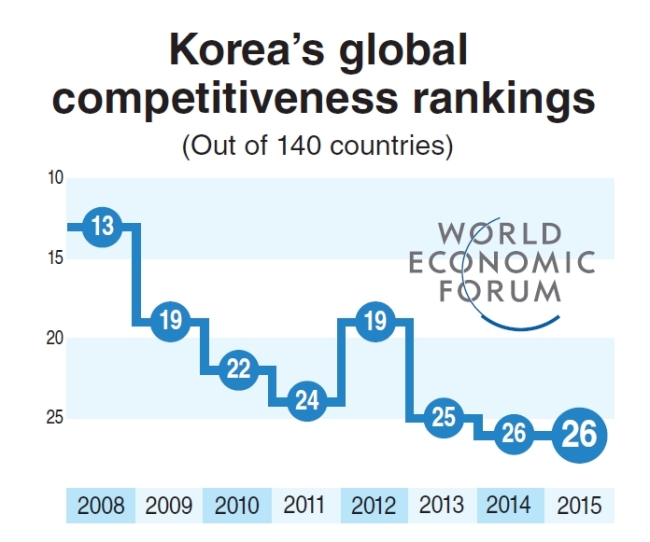Labor, finance holding back Korea: WEF
Korea’s 2015 global competitiveness ranking stays at 26th
By 정주원Published : Sept. 30, 2015 - 18:38
The World Economic Forum, commonly known as “Davos Forum,” called for improvements in Korea’s financial and labor sectors Wednesday, leaving the country’s global competitiveness ranking unchanged.
In this year’s “Global Competitiveness Report,” Korea rated 26th in the overall rankings of 140 member economies, the same place as last year.

To serve as a reference point for investors worldwide, the report assigns rankings based on a total of 114 items divided unevenly into 12 categories. Among them, the WEF gave poor marks to Korea in three categories -- institutional, labor market efficiency and financial market development.
The WEF said Korea need to improve these pillars, “an area where Korea remains one of the poorest performers among advanced economies.”
Korea rated 123rd in transparency of government policymaking, 120th in efficacy of corporate boards, 97th in burden of government regulations, 95th in ethical behavior of firms and 80th in favoritism in decisions of government officials.
Asia’s fourth-largest economy was placed in the middle range in wastefulness of government spending at 70th, judicial independence at 69th, and efficiency of legal framework in challenging regulations at 74th.
The WEF also highlighted policy instability, which “remains a concern for doing business and is ranked as the most problematic factor in this respect.”
Korea’s worst rating in all 141 items was cooperation in labor-employer relations of the labor market efficiency category, ranking 132nd.
The report states, “Restrictive labor relations rank as one of the most problematic factors for doing business in the country. The country is not fully leveraging its human capital potential, as evidenced by the low female participation in the labor force.”
Within the same category, Korea underperformed in hiring and firing practices, redundancy costs, effect of taxation on incentive to work and ratio of female employees to men, which fell between 91 and 117.
Pay and productivity (24th), country’s capacity to attract and retain talents (35th and 25th), and reliance on professional management (37th) stayed within the relatively high bracket.
The WEF was also critical about Korea’s development of financial market.
It rated Korea 119th in ease of access to loans, 113th in soundness of banks, 99th in availability of financial services and 89th in affordability of financial services.
“The financial market also continues to perform poorly (87th), as access to finance across all modes remains difficult.”
Hours after the release of the WEF report, Korea’s top financial regulator Financial Services Commission issued a press release refuting the criticism.
“WEF’s evaluation falls short of making objective comparisons among countries, since it is mainly composed of questionnaire surveys,” FSC alleged in the statement, describing the report as a “satisfaction survey” of businessmen.
“The report reuses the World Bank’s ‘World Business Environment Survey’ from last year,” the FSC claimed, adding that the WEF report disregarded the financial reforms and policies that have taken place since last year.
By Chung Joo-won (joowonc@heraldcorp.com)
In this year’s “Global Competitiveness Report,” Korea rated 26th in the overall rankings of 140 member economies, the same place as last year.

To serve as a reference point for investors worldwide, the report assigns rankings based on a total of 114 items divided unevenly into 12 categories. Among them, the WEF gave poor marks to Korea in three categories -- institutional, labor market efficiency and financial market development.
The WEF said Korea need to improve these pillars, “an area where Korea remains one of the poorest performers among advanced economies.”
Korea rated 123rd in transparency of government policymaking, 120th in efficacy of corporate boards, 97th in burden of government regulations, 95th in ethical behavior of firms and 80th in favoritism in decisions of government officials.
Asia’s fourth-largest economy was placed in the middle range in wastefulness of government spending at 70th, judicial independence at 69th, and efficiency of legal framework in challenging regulations at 74th.
The WEF also highlighted policy instability, which “remains a concern for doing business and is ranked as the most problematic factor in this respect.”
Korea’s worst rating in all 141 items was cooperation in labor-employer relations of the labor market efficiency category, ranking 132nd.
The report states, “Restrictive labor relations rank as one of the most problematic factors for doing business in the country. The country is not fully leveraging its human capital potential, as evidenced by the low female participation in the labor force.”
Within the same category, Korea underperformed in hiring and firing practices, redundancy costs, effect of taxation on incentive to work and ratio of female employees to men, which fell between 91 and 117.
Pay and productivity (24th), country’s capacity to attract and retain talents (35th and 25th), and reliance on professional management (37th) stayed within the relatively high bracket.
The WEF was also critical about Korea’s development of financial market.
It rated Korea 119th in ease of access to loans, 113th in soundness of banks, 99th in availability of financial services and 89th in affordability of financial services.
“The financial market also continues to perform poorly (87th), as access to finance across all modes remains difficult.”
Hours after the release of the WEF report, Korea’s top financial regulator Financial Services Commission issued a press release refuting the criticism.
“WEF’s evaluation falls short of making objective comparisons among countries, since it is mainly composed of questionnaire surveys,” FSC alleged in the statement, describing the report as a “satisfaction survey” of businessmen.
“The report reuses the World Bank’s ‘World Business Environment Survey’ from last year,” the FSC claimed, adding that the WEF report disregarded the financial reforms and policies that have taken place since last year.
By Chung Joo-won (joowonc@heraldcorp.com)







![[Hello India] Hyundai Motor vows to boost 'clean mobility' in India](http://res.heraldm.com/phpwas/restmb_idxmake.php?idx=644&simg=/content/image/2024/04/25/20240425050672_0.jpg&u=)










